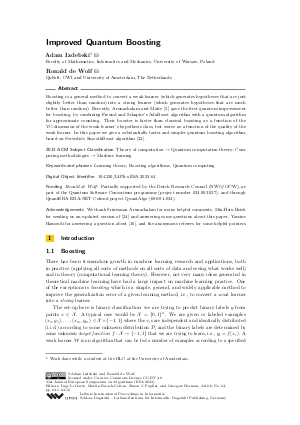@InProceedings{izdebski_et_al:LIPIcs.ESA.2023.64,
author = {Izdebski, Adam and de Wolf, Ronald},
title = {{Improved Quantum Boosting}},
booktitle = {31st Annual European Symposium on Algorithms (ESA 2023)},
pages = {64:1--64:16},
series = {Leibniz International Proceedings in Informatics (LIPIcs)},
ISBN = {978-3-95977-295-2},
ISSN = {1868-8969},
year = {2023},
volume = {274},
editor = {G{\o}rtz, Inge Li and Farach-Colton, Martin and Puglisi, Simon J. and Herman, Grzegorz},
publisher = {Schloss Dagstuhl -- Leibniz-Zentrum f{\"u}r Informatik},
address = {Dagstuhl, Germany},
URL = {https://drops.dagstuhl.de/entities/document/10.4230/LIPIcs.ESA.2023.64},
URN = {urn:nbn:de:0030-drops-187178},
doi = {10.4230/LIPIcs.ESA.2023.64},
annote = {Keywords: Learning theory, Boosting algorithms, Quantum computing}
}

 Creative Commons Attribution 4.0 International license
Creative Commons Attribution 4.0 International license










